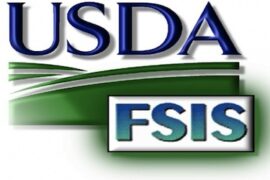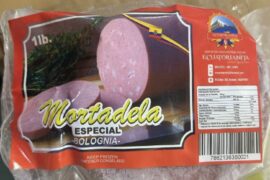Kebab shop owners in Europe are rejoicing, as are devotees of shawarma and gyro pita pocket sandwiches and other dishes made from seasoned meat shaved from large inverted cones that turn slowly on rotisseries equipped with vertical grilling elements.
Their exaltation followed the failure of a European Parliament resolution opposing the authorization of phosphate additives in kebab meat, which on December 13 came up three votes shy of 376 needed for an absolute majority. As such, the European Commission regulatory arm in Brussels may now proceed to officially allow the use of phosphoric acid, di and tri phosphates and polyphosphates (E 338-452) in kebab meat – be it mutton, lamb, veal, beef or poultry.
 According to the European Commission, the use of phosphates is required for a partial extraction and breakdown of meat proteins to form a protein film on vertical meat spits to bond meat pieces together in order to ensure homogenous freezing and roasting.
According to the European Commission, the use of phosphates is required for a partial extraction and breakdown of meat proteins to form a protein film on vertical meat spits to bond meat pieces together in order to ensure homogenous freezing and roasting.
Left/Right Food Fight
The resolution tabled by the Public Health and Food Safety Committee received 373 votes in favor, 272 against and 30 abstentions. The pro and con ballots were cast pretty much along left/right lines, with politicians on the left favoring the prohibition. The resolution called on the plenary to oppose the authorization due to health concerns and pending a scientific review of the additives to be published by the European Food Safety Authority before the end 2018.
Before the vote took place in Strasbourg, France, many persons engaged in kebab production, restaurant and other foodservice businesses expressed concern and even worry about their livelihoods.
“They are looking for ways to hurt Turkish businesses here,” said Baris Donmez, the owner of a 24-hour kebab shop in the Mitte district of Berlin, Germany. “Such a ban would be the biggest pile of garbage imaginable.”
It should be pointed out that the use of phosphate preservatives and binders are perfectly legal in the industrial production of other meat products, including burgers and sausages.
Kenan Koyuncu of the German Association of Döner Kebab Producers commented: “If the European Parliament gets its way, this would be the death sentence for the entire döner kebab industry in the European Union.”
While the European Parliament did “get its way,” the end result assured that the döner kebab as formulated today will not become a “goner kebab” in the EU tomorrow.
Phosphate additives keep döner kebabs, shawarma, gyros and other meat products juicier for longer periods of time, and prevents the meat from falling apart while being grilled on vertical spits in restaurants and take-away shops that are popular throughout Europe. However, members of the Greens-European Free Alliance (EFA) and Socialists & Democrats political groups believe there is a possible link between these additives and cardiovascular disease.
“There are serious concerns over the negative health impacts of phosphate additives. Recent studies have associated high phosphorus intake with increased mortality. Long-term high-phosphorus diets may impair bone health both in chronic kidney disease patients and in the healthy population,” said Greens/EFA Members of the European Parliament (MEP) Bart Staes of Flanders, Belgium, and the S&D’s Christel Schaldemose of Denmark in a joint statement.
‘Scare Mongering,’ Claims EPP
The center-right European People’s Party (EPP), on the other hand, insists that such talk is scare mongering.
Pointing out that the level of phosphates in kebabs is negligible, EPP Spokeswoman and MEP Renate Sommer of Germany remarked: “There is no proof that phosphates have negative health effects…The suggestion by the Greens and Social Democrats that phosphate additives could create a health hazard is ridiculous…The European Food Safety Authority (EFSA) rates intake of up to 4,200 mg of phosphate per day as safe. A portion of döner contains only 134 mg phosphate.”
Staes dismisses opposition to the phosphates ban as “pure populism” whipped up by political foes. “Nobody wants to prohibit the kebab,” he said. “We want to prohibit unhealthy phosphates in all meat preparations, and there already are alternatives. This is sad day for consumer rights, which have been trampled on.”
John Procter, a Conservative Member of the European Parliament from Yorkshire and the Humber in the United Kingdom, begged to differ: “This was a daft and damaging proposal which has quite rightly been skewered. Once again some MEPs want to ignore the principle of evidence-based decision making and believe they know better than the EU’s own scientific experts…The use of phosphates in döner kebabs makes up a tiny part of our overall exposure. Kebab shops are an integral part of many high streets and can remain so after this vote.”
In fact, while not authorized under EU law, the use of phosphates in kebabs produced, sold and consumed in Europe has been ongoing for some time, It prohibition, however, has not generally been enforced.
Kohli’s Takeaway
Hardeep Singh Kohli, British broadcaster, author of “Indian Takeaway” and former kitchen comedian provides an interesting take on the issue in an opinion piece published on December 17 in Scotland’s Sunday Herald headlined “Listen Europe, if you try to take my kebab I’ll become a Brexiteer.” The article concludes:
“Health and welfare are important. I have been a passionate advocate for the licensing of fast food outlets in the same way we license alcohol – bad food harms a society as much, if not more, than excessive alcohol. But in their (MEPs) attempts to keep us living longer, healthier lives they seem to forget one thing. What’s the point of giving me an extra ten years on the planet if it is a ten years without all those things that bring me joy? And at the top of that list is most definitely a döner kebab.”





